Key takeaways:
- Prioritize authenticity by aligning sponsorships with personal values to build trust and deepen connections with the audience.
- Consistent personal branding enhances credibility and attracts brands that resonate with your established identity.
- Transparent communication and feedback with the audience foster genuine relationships and ensure sponsorships feel authentic.
- Measuring success goes beyond metrics; focus on the impact and emotional connections created within the community.
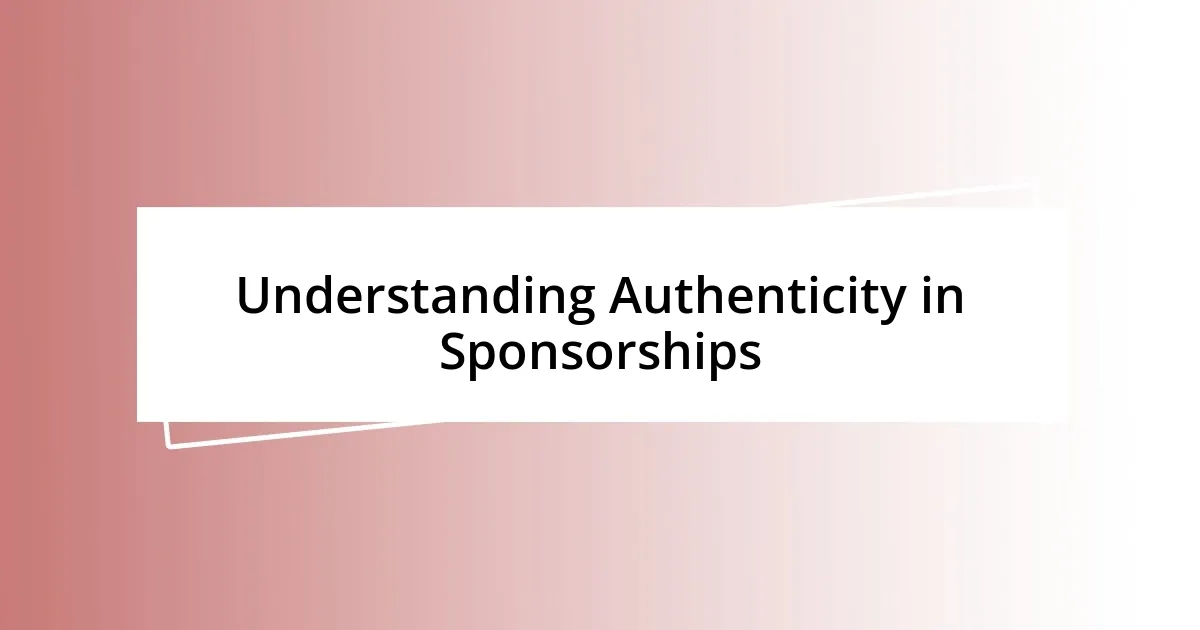
Understanding Authenticity in Sponsorships
Authenticity in sponsorships is all about staying true to your values while promoting a brand. I remember a time when a brand approached me that didn’t quite align with my message. It was a tough decision, but I declined the offer because it didn’t feel right. Trust me, it’s essential to realize that your audience can sense insincerity; they want to connect with someone who genuinely believes in what they endorse.
When I think of authenticity, I often ask myself: “What do my followers expect from me?” It’s this self-reflection that helps me determine the partnerships that truly resonate. For instance, I partnered with a sustainable brand recently, and it felt rewarding to share products that matched my passion for environmental responsibility. The excitement I felt was palpable, which made the campaign feel like a natural extension of my content rather than a forced promotion.
In the ever-evolving landscape of sponsorships, maintaining authenticity requires a delicate balance. Finding that synergy between your personal brand and the sponsored message can lead to amazing experiences. I’ve found that when I align my partnerships with my personal beliefs, not only do my audiences appreciate it, but it also gives me a genuine sense of fulfillment. How do you find that connection in your own journey?
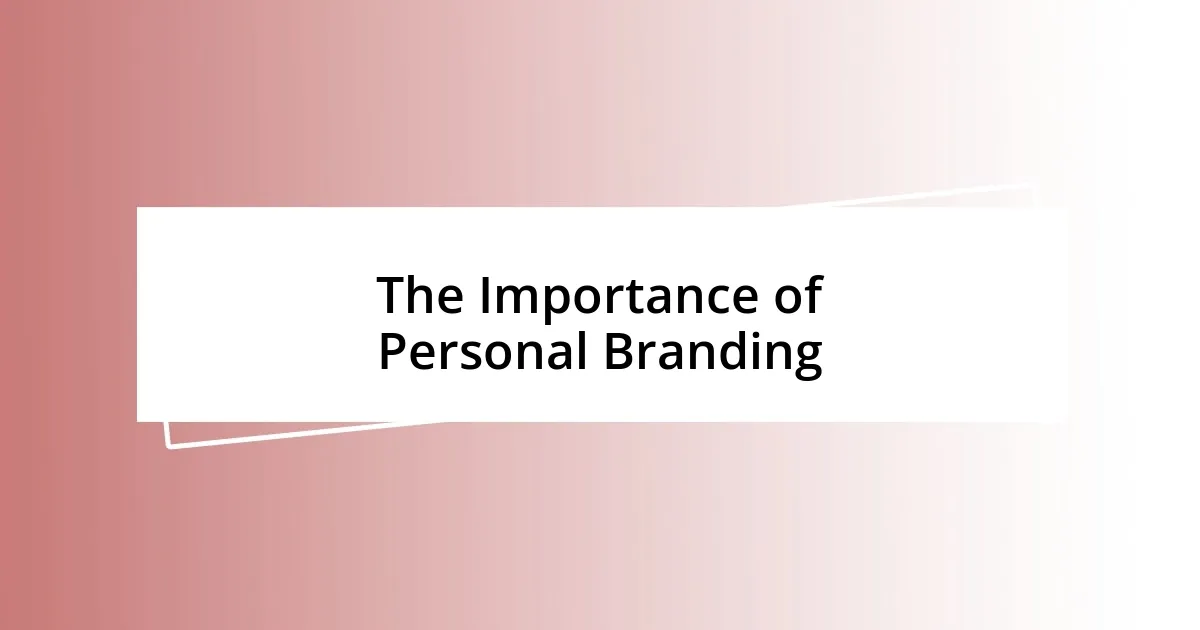
The Importance of Personal Branding
Building a strong personal brand is crucial in today’s digital landscape. It’s not just about promoting products; it’s about sharing your narrative and values with the world. I recall creating my brand story, focusing on the moments that shaped my beliefs. When I conveyed those experiences authentically, I could see my audience relating to me on a deeper level. That connection reinforced the importance of being genuine.
Another key aspect of personal branding is consistency. It’s essential to present a unified message across all platforms, as this builds credibility. I experienced this firsthand when I consistently shared content that reflected my values and passions. Over time, my followers began to recognize me as a reliable source for information and inspiration. This loyalty is what separates a personal brand from the noise.
Finally, personal branding helps in attracting the right sponsorships. Your audience trusts you because of your authenticity, and brands see that value too. I had an opportunity to collaborate with a well-known brand that appreciated my niche. The partnership worked seamlessly, and I felt proud demonstrating their products because they complemented my established brand identity. Finding that alignment not only strengthens your brand but fosters meaningful connections with both your audience and sponsors.
| Aspect | Importance |
|---|---|
| Authenticity | Builds trust and deeper connections with the audience. |
| Consistency | Creates a reliable brand image and enhances credibility. |
| Sponsorship Alignment | Attracts brands that resonate with your personal brand, leading to successful collaborations. |

Identifying Your Core Values
Identifying your core values is crucial for maintaining authenticity in sponsorships. To me, it feels like holding a mirror to my soul and asking what truly matters. I often find it helpful to think about the principles that guide my decisions, both personally and professionally. For instance, when I reflect on moments where I felt the most fulfilled, they were tied to my beliefs in sustainability and community engagement. These reflections not only clarify my path but also help me draw the lines between genuine sponsorships and those that might lead me astray.
Here’s how I pinpoint my core values:
– Self-Reflection: I regularly assess my passions and interests to understand what genuinely drives me.
– Feedback: Listening to my audience helps me identify values that resonate with them.
– Situational Insights: Analyzing past experiences, especially those that brought me joy or disappointment, gives clarity on what I stand for.
– Values Survey: Taking part in values exercises or quizzes can reveal underlying principles in a fresh light.
Finding these core values helps illuminate the right partnerships for me, allowing any collaboration to feel like an extension of my authenticity rather than a departure from it.

Evaluating Potential Sponsorships
Evaluating potential sponsorships is an essential step to ensure they align with my values. I remember a time when I was approached by a brand eager to support my work, but their practices didn’t sit well with me. It was a moment of reflection—should I prioritize the financial reward or stay true to my principles? In the end, I chose to decline the partnership, feeling a sense of relief and reaffirmation about my commitment to authenticity.
As I delve into potential collaborations, I ask myself: Does this brand resonate with my audience? I’m not just looking for financial backing; I want to create meaningful experiences. For example, when I collaborated with a local eco-friendly company, the response from my community was overwhelmingly positive because it aligned with my sustainable values. Their mission echoed my own, fostering a genuine connection that made the partnership feel seamless.
Additionally, I rely on a set of criteria to evaluate these opportunities. I consider factors such as the brand’s reputation, their mission, and how they treat their customers and employees. One time, I came across a sponsorship offer that seemed lucrative but revealed troubling labor practices upon further investigation. I realized that while some offers sparkle, they don’t always shine brightly in areas that matter most to me. How can I champion a brand if its values contradict my deeply held beliefs? It’s a question I grapple with, ensuring every collaboration authentically reflects who I genuinely am.
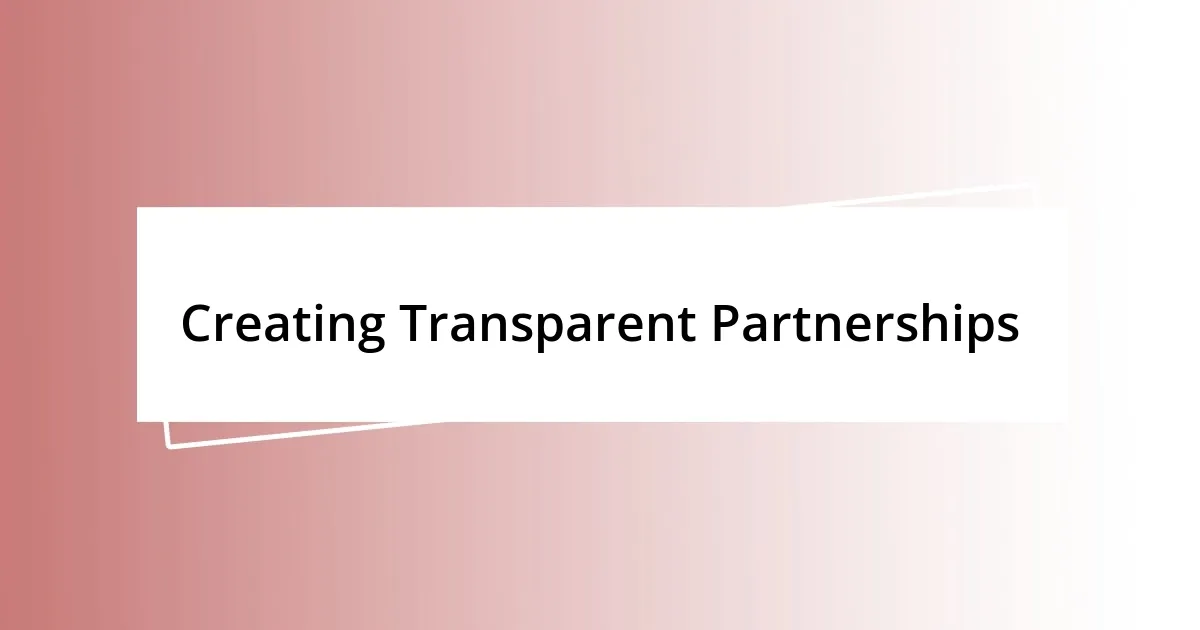
Creating Transparent Partnerships
Creating transparent partnerships is all about clear communication and shared values. In my experience, one of the best ways to achieve that transparency is to have open conversations with potential sponsors. For instance, I recall a time when I explicitly expressed my concern about the environmental implications of a product. The brand responded positively, engaging in a fruitful dialogue that not only clarified their practices but also allowed me to share my audience’s expectations. This exchange laid a solid foundation for a partnership steeped in trust.
I’ve found that sharing insights and behind-the-scenes looks builds credibility with my audience. When I first began collaborating with a wellness brand, I took my followers on the journey—showing them how the partnership came to life and highlighting the brand’s commitment to ethical sourcing. I wanted them to see the alignment in our values. By being transparent, I encouraged an authentic connection that went deeper than just a promotional opportunity. Have you ever considered how much your audience values that level of honesty? It’s incredibly powerful.
Ultimately, maintaining transparency means being willing to say no. I’ve faced situations where the financial incentive was enticing, but I just couldn’t align with the brand’s practices or messaging. Once, I turned down a sponsorship that didn’t prioritize ethical standards, even as I felt a momentary pang of regret. Yet, looking back, that choice left room for partnerships that felt right—a reminder that authenticity, while occasionally challenging, is always worth the effort.
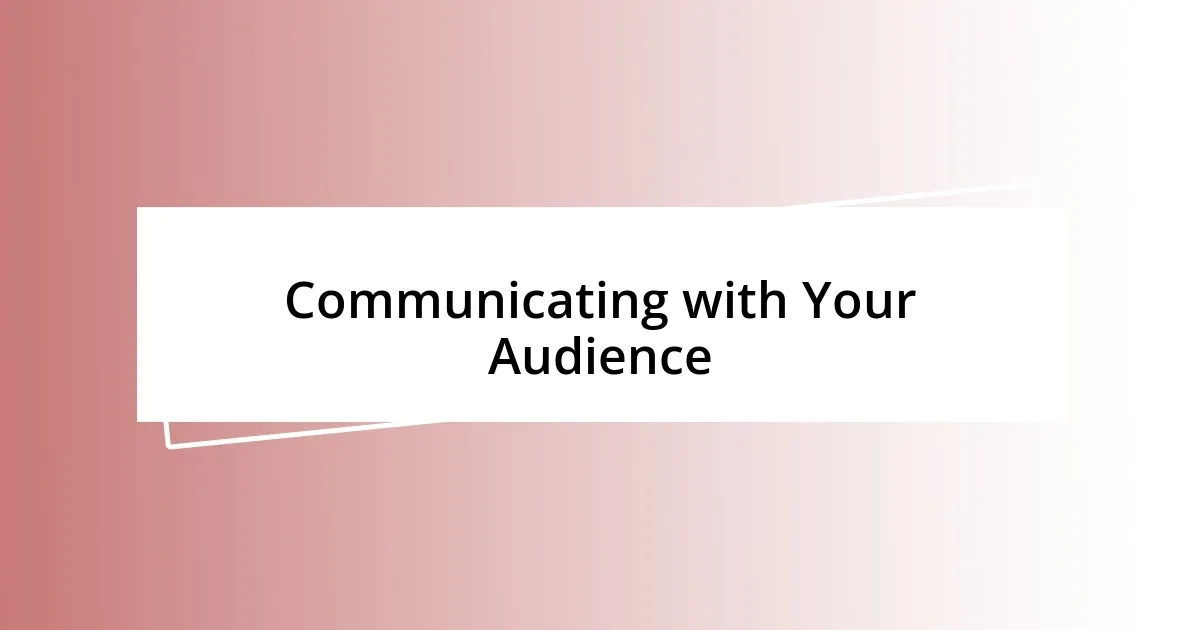
Communicating with Your Audience
Communicating with my audience is a vital part of maintaining authenticity, especially when sponsorships come into play. I often find myself sharing my decision-making process openly, which fosters trust. For example, during a recent partnership, I posted a candid video discussing the brand’s values and how they aligned with my beliefs. The heartfelt messages from followers reaffirmed that when I share my journey, it resonates deeply with them.
When I receive feedback from my community, it inspires me to keep the lines of communication open. A while ago, after a collaboration, I was surprised to learn that some of my followers felt uneasy about the product. Instead of brushing it off, I created a post addressing their concerns and sought to understand their perspectives. It taught me that listening is just as important as talking; engaging in conversation ensures I’m not only promoting a product but also nurturing a relationship with my audience.
I’ve learned that vulnerability can be a powerful tool in communication. One time, I shared a personal story about how a sponsorship deal fell through. I expressed my disappointment but emphasized that it was important to me to stand by my values. The overwhelming support and understanding from my audience left me feeling connected and assured that they value my authenticity over affiliate earnings. Have you ever felt that same connection with someone being open with you? It’s that emotional bond that drives real engagement.
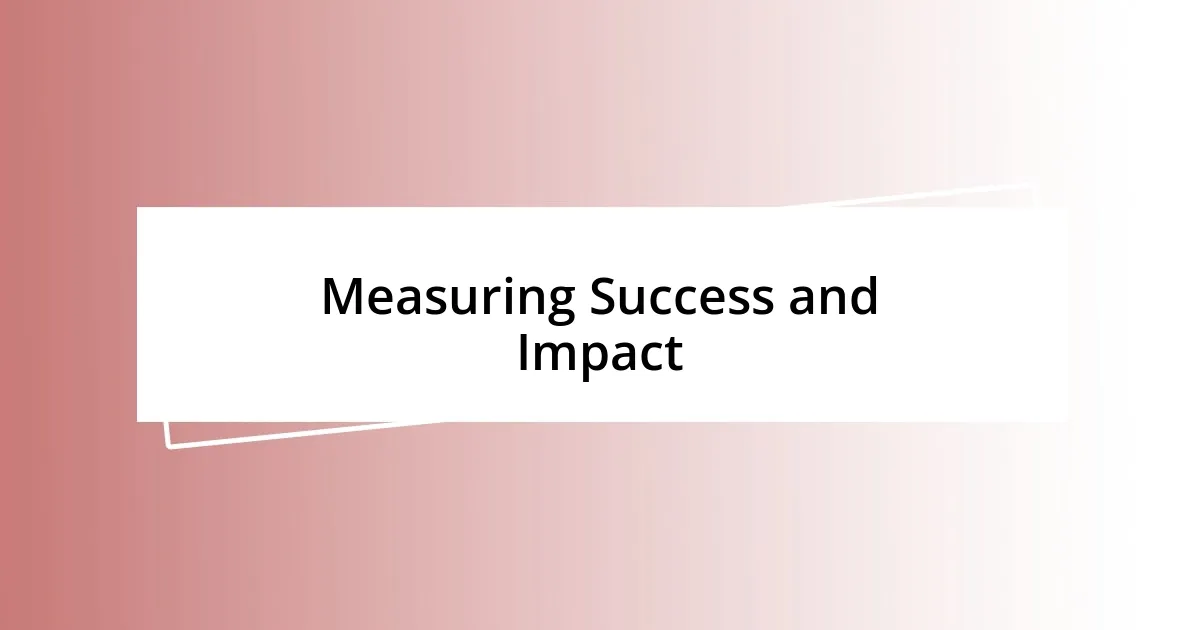
Measuring Success and Impact
Measuring success in sponsorships goes beyond just numbers; it hinges on the impact I create within my community. For example, after partnering with a skincare brand, I noticed a significant increase in conversations around self-care and mental health. The engagement on my posts shifted from mere likes to deeper discussions, making me realize that resonating with my audience was a true measure of success. Isn’t that what we all strive for—to foster genuine connections?
The feedback I receive often reveals the real effects of my sponsorships. I remember vividly after promoting a fitness program, many followers reached out to share personal stories of their transformative journeys. These heartfelt messages not only made me proud of the collaboration but also highlighted how authentically sharing the brand’s message had motivated others. It’s fascinating to see how an honest endorsement can spark change. Have you ever felt that your words made a difference in someone’s life? That’s the true power of impact.
I often use analytics as one tool to gauge success, but the emotional responses I capture matter even more. Just last month, I posted a Q&A addressing concerns about a product I promoted. The volume of heartfelt replies and shared experiences showed that my audience valued transparency. Sharing and analyzing qualitative feedback alongside quantitative data creates a comprehensive view of impact, and I find it’s essential to pay attention to both. After all, isn’t it rewarding to realize we’re part of something bigger than just a transaction?














